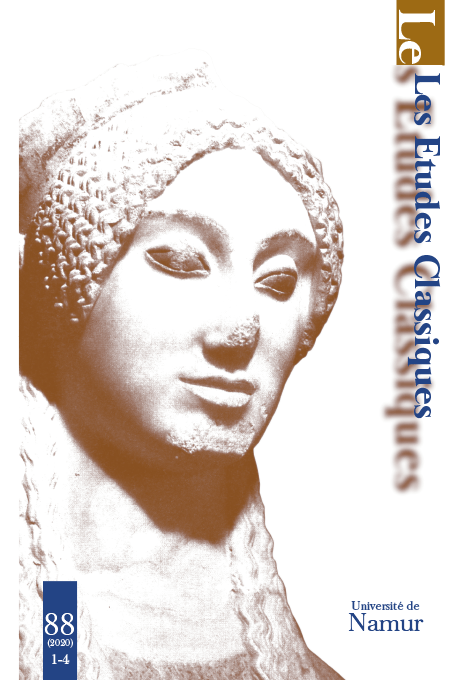 previous article in this issue previous article in this issue | next article in this issue  |

|
Document Details : Title: Neologismos Caldaicos (I) Subtitle: Notas sobre καναχισμός, ἀείπολος, προπόρευμα, μηναῖος y ἐπιβήτης Author(s): FERNÁNDEZ FERNÁNDEZ, Álvaro Journal: Les Études Classiques Volume: 86 Issue: 1-4 Date: 2018 Pages: 311-356 DOI: 10.2143/LEC.86.1.3290495 Abstract : These notes clarify the meanings of five words that are documented for the first time in the Chaldean Oracles, and, according to the existing data, deserve to be regardedas Chaldean neologisms: καναχισμός (Orac. Chald., 61c Places), ἀείπολος (61f), προπόρευμα (64 & 107), μηναῖος (61c, 61f, 64 & 216), and ἐπιβήτης (216). Our discussion considers the possibility that Hippolytus of Rome had read the Oracles; the authenticity of Oraculum 216, whose verse 4 Olympiodorus the Younger attributed to Orpheus (OF, 843 F Bernabé = fr. 353Kern), is defended; and it is argued that the hexameter αὐχμηραί τε νόσοι καὶ σήψιες ἔργα τε ῥευστά (Orac. Chald., 134, 3) was wrongly attributed to Empedocles (B 121 Diels & Kranz). Ces quelques notes éclairent la signification de cinq mots, attestés pour la première fois dans les Oracles chaldaïques, que les données disponibles permettent de considérer comme des néologismes chaldéens: καναχισμός (Orac. Chald., 61c Places), ἀείπολος (61f), προπόρευμα (64 et 107), μηναῖος (61c, 61f, 64 et 216) et ἐπιβήτης (216). La discussion envisage la possibilité qu’Hippolyte de Rome ait lu les Oracles, défend l’authenticité de l’Oracle 216, dont Olympiodore le Jeune attribue le 4e vers à Orphée (OF, 843 F Bernabé = fr. 353Kern), et montre que l’hexamètre αὐχμηραί τε νόσοι καὶ σήψιες ἔργα τε ῥευστά (Orac. Chald., 134, 3) a été à tort attribué à Empédocle (B 121 Diels & Kranz). |
 |
